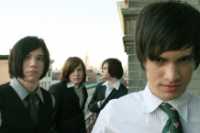Some bands spend their whole careers just hoping to produce an album as complex, cohesive and creative as A Fever You Can't Sweat Out. Not Panic! At The Disco: They managed to get it right on the first try.
Before you grab a cold washcloth, let's diagnose what caused A Fever.
It all started in the suburbs of Las Vegas when 12-year-old Ryan Ross asked his parents for a guitar for Christmas. Not to be outdone, neighborhood pal Spencer Smith begged his parents for a drum set so the duo could start jamming. "Really, from that first year [playing instruments], all we really did was cover Blink 182 songs," remembers Spencer, laughing. The band eventually matured, moved on from all the small things and recruited classmates Brent Wilson and Brendon Urie on bass and vocals, respectively.
With the final lineup now in place, the newly christened Panic! At The Disco (from a line in the Name Taken song "Panic") started practicing in Spencer's grandmother's living room and began crafting the songs that would eventually make their way onto A Fever You Can't Sweat Out. With their flair for experimental instrumentation and intimately observant lyrics, it wasn't long before the band sparked the interest of Fall Out Boy's Pete Wentz, who brought the band to Decaydance/Fueled By Ramen, a label with a green thumb for new talent. "We really clicked with [Decaydance/Fueled By Ramen] and they understood what we wanted to do as a band," Ryan explains. "They gave us a lot of freedom to do what would make us happy with our music."
Soon after signing, things got serious and started moving forward at a rapid pace. Spencer and Brent finished high school through distance education; Brendon was taking classes during the day, practicing at night and barely scraping by his senior year; and Ryan decided to leave college at the end of his freshman year, causing a huge rift between him and his family. "When I told my dad I wanted to drop out and write music, he definitely flipped out. It was a battle between me being happy and doing what would make him happy." So minus the blessing of one father, the four friends packed up, left home for the first time and headed east to College Park, Maryland, to record their debut album with famed producer Matt Squire (Thrice, Northstar, The Receiving End Of Sirens).
"We didn't want to write a record that had 11 of the same songs on it," explains Ryan. In order to make sure that didn't happen, the band came up with the concept to divide the album in two halves: the first being futuristic, complete with drum machines and synthesizers, and the second being nostalgic, complete with Vaudevillian piano and accordion. "It was too extremes of influence being put next to each other: the most electronic music we have on the record and the most old, out-of-style music we have on the record." The band took pointers from some of their biggest—although not overt—influences: Third Eye Blind's melodic song structures (on "But It's Better When We Do"), Queen's theatric instrumentation (on "Build God, Then We'll Talk") and Counting Crows' vivid and narrative lyrics (on "There's A Good Reason These Tables Are Numbered Honey, You Just Haven't Thought Of It Yet"). "You wouldn't hear our record and say, 'Hmmm, these guys are influenced by Fleetwood Mac or Counting Crows, 'but those are our favorite bands," insists Spencer.
It's this split-brain approach to songwriting that has resonated with listeners young and old. The band has scored big with PureVolume (continually being on the site's Top 10 Signed Bands chart) and MySpace (reaching #1 on the indie charts), and when they returned to Las Vegas after recording, they played a hometown show (actually, the band's first live concert ever) and over two hundred people showed up. The boys' parents, especially Ryan's father, realized the band was more than just a fleeting hobby and eventually became card-carrying members of Panic! At The Disco's fan club.
